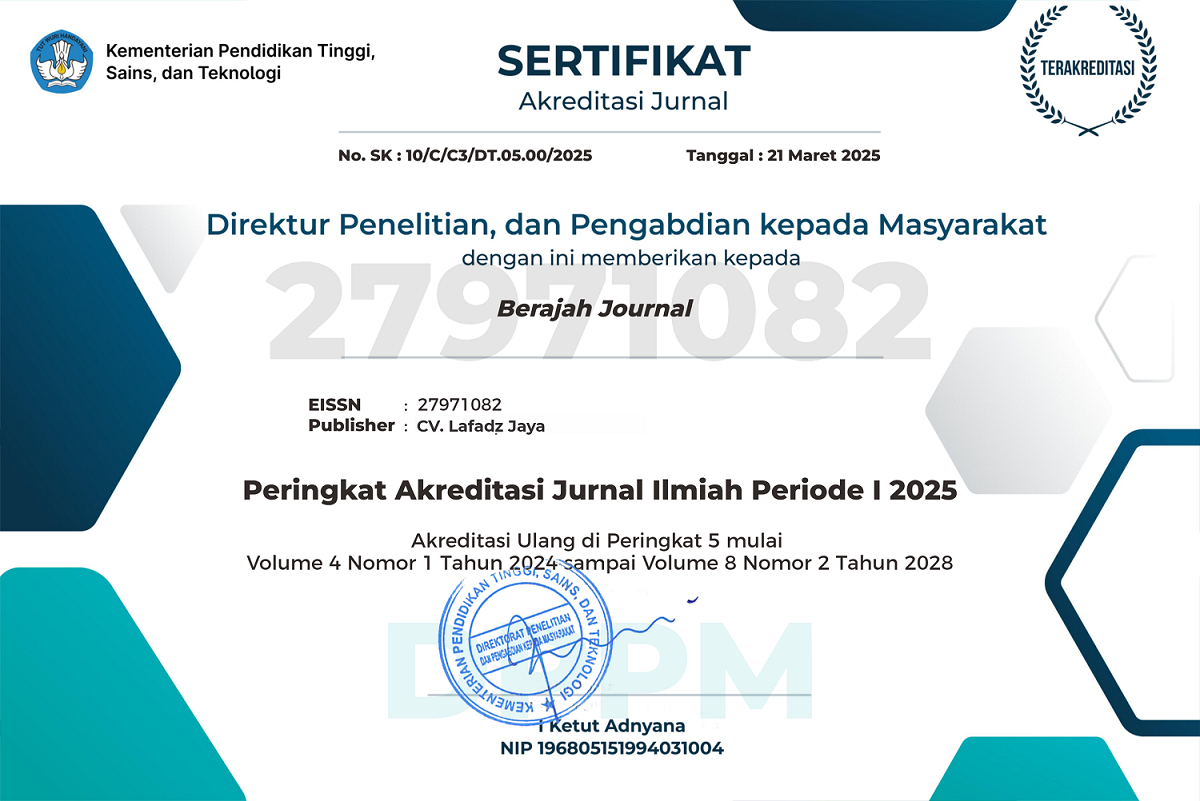THE INFLUENCE OF LEADERSHIP STYLE ON TEACHER LOYALTY THROUGH WORK DISCIPLINE IN MIDDLE SCHOOLS AT THE ESA PRAKARSA EDUCATION FOUNDATION LANGKAT DISTRICT
DOI:
https://doi.org/10.47353/bj.v3i3.262Keywords:
Leadership Style, Work Discipline, Teacher loyaltyAbstract
The purpose of this study was to determine and analyze the effect of leadership style on teacher loyalty mediated by work discipline in secondary schools at the Esa Prakarsa Education Foundation, Langkat Regency. This research was conducted at the Esa Prakarsa Education Foundation, Langkat Regency. The type of research is associative quantitative. The population in this study were 80 teachers. The sampling technique in this study used a saturated sample where the entire population was sampled. The results of this study indicate that leadership style has no significant effect on teacher loyalty, but has a significant effect on improving teacher work discipline. Teacher work discipline is also proven to have a positive and significant effect on teacher loyalty. In the indirect effect it was found that work discipline was able to mediate the effect of leadership style on teacher loyalty significantly. This finding indicates that although leadership style does not directly affect teacher loyalty, through improving teacher work discipline, the impact can be mediated so that it contributes to increasing teacher loyalty. Therefore, teacher work discipline has an important mediating role in linking leadership style with teacher loyalty in the Esa Prakarsa Education Foundation Middle School, Langkat Regency. These findings provide important insights for the development of leadership and management strategies in educational institutions to improve work discipline which will ultimately have an impact on teacher loyalty.
Downloads
References
Agustini, F. (2019). Manajemen Sumber Daya Manusia Lanjutan. Madenatera.
Edison et al. (2016). Manajemen dan Sumber Daya Manusia. Edisi Pertama. Alfabeta.
Fachrunnisa, O. (2019). Pengaruh Gaya Kepemimpinan dan Disiplin Kerja Terhadap Kinerja Karyawan Pada PT. Permadi Wijaya Sidoarjo. Jurnal Ilmu Manajemen. Universitas Negeri Surabaya, 7.
Ghozali & Latan. (2015). Konsep, Teknik, Aplikasi Menggunakan Smart PLS 3.0 Untuk Penelitian Empiris. BP Undip. SemarangHarnanto. 2017. Akuntansi Biaya: Sistem Biaya Historis. BPFE.
Ghozali, Imam & Latan, H. (2015). Partial Least Squares “Konsep Teknik dan Aplikasi Menggunakan Program Smart PLS 3.0.” Universitas Diponegoro.
Hasibuan, Malayu SP. (2017). Manajemen Sumber Daya Manusia. Bumi Aksara.
Kuncooro, Munajad. (2013). Metode Riset Untuk Bisnis dan Ekonomi. Edisi 4. Erlangga.
Manda, D., & Sose, A. T. (2023). Transformational leadership, Work Disipline, and Organizational Commitments Influence on Employee Performance. 3(1). https://doi.org/10.55606/bijmt.v3i1.1167
Nisyak, I. R. (2016). Pengaruh Gaya Kepemimpinan, Motivasi dan Disiplin Kerja Terhadap Kinerja Karyawan. Jurnal Ilmu dan Riset Manajemen, 5(4).
Ong, S., Hendry, H., Winata, V., & Monika, M. (2021). The Influence of Discipline, Work Environment, and Work Commitment on Job Satisfaction. International Journal of Social Science and Business, 5(2). https://doi.org/10.23887/ijssb.v5i2.34976
Rahayu, I. D., Musadieq, M. A., & Prasetya, A. (2017). Pengaruh Gaya Kepemimpinan dan Program Keselamatan dan KesehatanKerja Terhadap Motivasi Kerja (Studi pada Karyawan Tetap Maintenance Department PT Badak LNG Bontang). Jurnal Administrasi Bisnis (JAB), 43(1).
Rivai. (2019). Manajemen. Penerbit Fakultas Ekonomi dan Bisnis Universitas Muhammadiyah Palembang.
Robbins, P. S., & Judge, T. A. (2017). Organizational Behavior (17th ed). Pearson Education.
Sehfudin, A. (2011). Pengaruh Gaya Kepemimpinan, Komunikasi Organisasi dan Motivasi Kerja Karyawan (Studi Pada Bank Tabungan Pensiunan Nasional Cabang Semarang). kultas Ekonomi Universitas Diponegoro, Semarang. https://eprints.ums.ac.id/43608/12/7.%20Daftar%20Pustaka.pdf
Siswanto. (2015). Manajemen Tenaga Kerja Indonesia, edisi. 2,. Bumi Aksara.
Siswanto, S., Masyhuri, M., Maksum, I., & Murdiansyah, I. (2020). The role of job satisfaction as a mediating variable on leadership styles to employee performance. Jurnal Ekonomi Modernisasi, 16(1), 54–65. https://doi.org/10.21067/jem.v16i1.4796
Sudimin. T. (2003). Whistleblowing: Dilema Loyalitas dan Tanggung Jawab Publik. Jurmal Manajemen Dan Usahawan, Vol. 12 No. 11. Hlm 3-8.
Downloads
Published
How to Cite
Issue
Section
License
Copyright (c) 2023 Syahrizal, Mesra B

This work is licensed under a Creative Commons Attribution 4.0 International License.






















